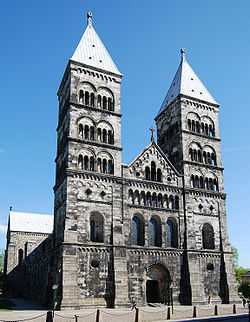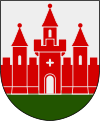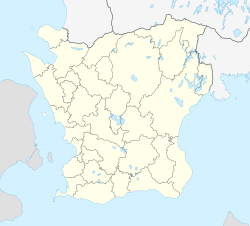Lund
| Lund | ||
|---|---|---|

Lund Cathedral
|
||
|
||
| Motto: Idéernas stad (Eng: The city of ideas) | ||
| Coordinates: 55°42′14″N 13°11′42″E / 55.70389°N 13.19500°ECoordinates: 55°42′14″N 13°11′42″E / 55.70389°N 13.19500°E | ||
| Country | Sweden | |
| Province | Scania | |
| County | Skåne County | |
| Municipality | Lund Municipality | |
| Area | ||
| • Total | 25.75 km2 (9.94 sq mi) | |
| Population (2015) | ||
| • Total | 87,244 | |
| • Density | 3,388/km2 (8,770/sq mi) | |
| Time zone | CET (UTC+1) | |
| • Summer (DST) | CEST (UTC+2) | |
| Website | www |
|
Lund (Swedish pronunciation: [lɵnd]) is a city in the province of Scania (Skåne), southern Sweden. The town had 87,244 inhabitants in 2015, out of a municipal total of 118,150 in 2016. It is the seat of Lund Municipality, Skåne County.
Lund is believed to have been founded around 990, when Scania belonged to Denmark. It soon became a major Christian centre of the Baltic Sea region, at a time when the area was still a frontier area for Christian mission, and within Scandinavia and especially Denmark through the Middle Ages. From 1103 it was the see of the Catholic Metropolitan Archdiocese of Lund, and the towering Lund Cathedral, built circa 1090–1145, still stands at the centre of the town. Lund was transferred to Sweden following the signing of the Treaty of Roskilde in 1658. It was temporarily the capital of Sweden between 1716 and 1718.
Lund University, established 1666, is today one of Scandinavia's largest institutions for education and research. The university and its buildings dominate much of the centre of the city, and have led to Lund becoming a centre for high-tech industry in the south of Sweden. Numerous literary and intellectual figures have lived or studied in Lund, including the writer August Strindberg and the scientist and naturalist Carl Linnaeus.
Along with Sigtuna, Lund is the oldest city in present-day Sweden. Lund's origins are unclear. Until the 1980s, the town was thought to have been founded around 1020 by either Sweyn I Forkbeard or his son Canute the Great of Denmark. The area was then part of the kingdom of Denmark. But, recent archaeological discoveries suggest that the first settlement dated to circa 990, possibly the relocation of settlers at Uppåkra. The Uppåkra settlement dates back to the first century B.C. and its remains are at the present site of the village of Uppåkra. King Sweyn I Forkbeard moved Lund to its present location, a distance of some five kilometres (3.1 miles). The new location of Lund, on a hill and across a ford, gave the new site considerable defensive advantages in comparison with Uppåkra, situated on the highest point of a large plain.
...
Wikipedia



